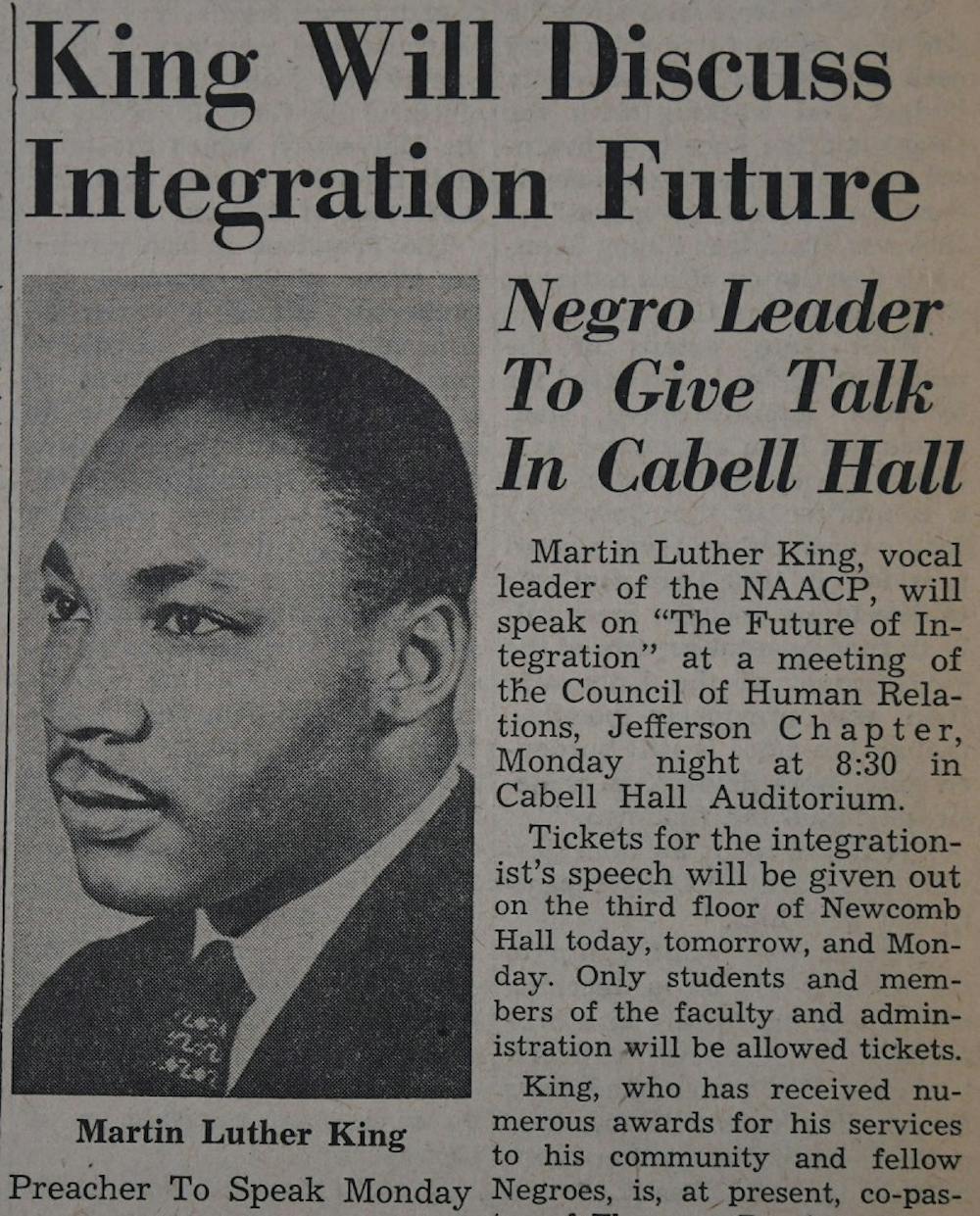Over 50 years after Dr. Martin Luther King, Jr.’s visit to the University, a plaque is being installed in the Old Cabell Hall auditorium — the same place he gave a speech in 1963 — to commemorate his legacy.
The plaque will be unveiled Monday and is being donated by Wesley Harris, a former student and chairman of the local Virginia Council on Human Relations during King’s 1963 visit, and his brother William Harris, who was Dean of the Office of African-American Affairs from 1976 to 1981.
King spoke at Old Cabell Hall — then known as Cabell Hall — on March 25, 1963. Nearly 900 people attended the event, according to an article published two days later in The Cavalier Daily.
The speech started with King asking “Are we really making progress in race relations?” and he described racial segregation as a nationwide problem.
“Segregation is a cancer … which must be removed,” he told the audience.
Wesley Harris said in an interview with The Cavalier Daily that he was inspired to donate the plaque by a similar installation he noticed on Princeton’s campus during a visit there. After seeing Princeton’s commemorative plaque, Harris reached out to the University to donate one in honor of the speech King gave in Old Cabell Hall.
Harris and Paul Gaston, a professor at the time, were closely involved with King’s visit to the University. Gaston first invited King to the University after meeting him at a conference in Nashville the year before.
Gaston remembered King’s visit to Grounds during a panel discussion titled “When King Came to U.Va.” that he held with former University Prof. Julian Bond in 2011.
“We had some good conversation, and I said, ‘Well what do you think about coming up to Charlottesville sometime?’” Gaston said in 2011, describing a conversation with King.
Bond, who passed away in 2015, said during the discussion that at the time, Charlottesville was far from integrated, and King’s visit to the University came after what many believed was a failed campaign in Albany, Ga.
“While surely not as hostile to black aspirations as Albany, Ga., Charlottesville, Va. then was not the oasis of liberalism it appears to be today,” Bond said. “The Charlottesville that King visited in 1963 had managed some token integration, but was still a city where black citizens drank at separate water fountains.”
Harris also recognized the hostility towards black citizens in Charlottesville and throughout the South.
“I, as a Southerner, a black Southerner … knew that the murder of blacks was commonplace,” Harris said during the panel discussion.
In fact, Harris said the administration refused to even acknowledge King’s visit, as did many of the students.
“The majority of the students were certainly opposed [to King’s cause],” Harris said in an interview with The Cavalier Daily.
Gaston said at the 2011 panel the speech was almost completely ignored by University staff, except for one dean sympathetic to the cause who attended the event.
As a result, tensions were high. While walking by Brown College with King and Gaston, Harris heard a car backfire, and thinking it was a gunshot aimed at King, he shielded the civil rights leader with his body.
“A car backfired, and my immediate response was to shield Dr. King,” Harris said during the panel discussion.
King remained calm, despite what the men at first believed to be an assassination attempt.
“He showed no fear at all, only courage,” Harris said.
Harris and Gaston were impressed by King’s personality, intelligence and gift for public speaking. Harris remarked that King did not use notes for his speech and even accurately quoted Gandhi, Kant and even Jefferson.
“To my delight, Dr. Martin Luther King was as scholarly as any person would ever want,” Harris said. “He was everything I expected him to be and more.”
Now, years later, Harris said he hopes the commemorative plaque will help to keep King’s legacy alive.
“I would hope that those of us who haven’t will take a moment to reflect upon that plaque and understand his gift, his challenge to resist injustice,” Harris said.







